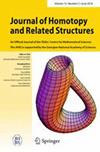非k相等流形的Lusternik-Schnirelmann范畴和拓扑复杂度
IF 0.5
4区 数学
Q2 MATHEMATICS
引用次数: 0
摘要
对于d, k和n的某些值,我们计算Lusternik-Schnirelmann类别和所有非k相等流形\(M_d^{(k)}(n)\)的更高拓扑复杂性。这包括已知\(M_d^{(k)}(n)\)是合理非形式化的实例。我们计算的关键因素是多布林斯基亚和图尔钦所描述的上同环\(H^*(M_d^{(k)}(n))\)的知识。一个精细的调整来自于阻碍理论技术的使用。本文章由计算机程序翻译,如有差异,请以英文原文为准。
On Lusternik–Schnirelmann category and topological complexity of non-k-equal manifolds
We compute the Lusternik–Schnirelmann category and all the higher topological complexities of non-k-equal manifolds \(M_d^{(k)}(n)\) for certain values of d, k and n. This includes instances where \(M_d^{(k)}(n)\) is known to be rationally non-formal. The key ingredient in our computations is the knowledge of the cohomology ring \(H^*(M_d^{(k)}(n))\) as described by Dobrinskaya and Turchin. A fine tuning comes from the use of obstruction theory techniques.
求助全文
通过发布文献求助,成功后即可免费获取论文全文。
去求助
来源期刊

Journal of Homotopy and Related Structures
MATHEMATICS-
CiteScore
1.20
自引率
0.00%
发文量
21
审稿时长
>12 weeks
期刊介绍:
Journal of Homotopy and Related Structures (JHRS) is a fully refereed international journal dealing with homotopy and related structures of mathematical and physical sciences.
Journal of Homotopy and Related Structures is intended to publish papers on
Homotopy in the broad sense and its related areas like Homological and homotopical algebra, K-theory, topology of manifolds, geometric and categorical structures, homology theories, topological groups and algebras, stable homotopy theory, group actions, algebraic varieties, category theory, cobordism theory, controlled topology, noncommutative geometry, motivic cohomology, differential topology, algebraic geometry.
 求助内容:
求助内容: 应助结果提醒方式:
应助结果提醒方式:


